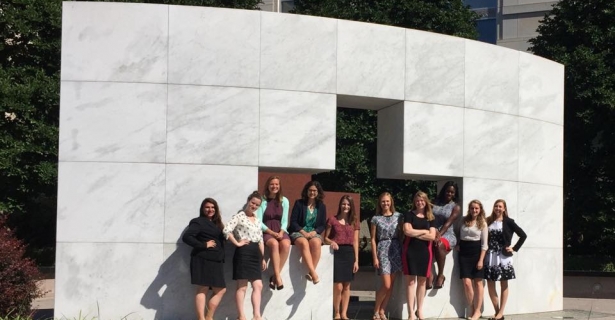Katie Saviano interned this summer at the Bureau of Population, Refugees, and Migration in Washington D.C. She is majoring in International relations and Arabic.
This summer, I interned with the Bureau of Population, Refugees, and Migration (PRM) at the U.S. Department of State. PRM is the humanitarian arm of the State Department, and as such, is tasked with providing aid and sustainable solutions for refugees, victims of conflict and stateless people around the world. Within PRM, my office, the Office of Refugee Admissions (PRM/A), focuses specifically on running the US Refugee Admissions Program (USRAP), which resettles refugees in the United States. (I know, so many acronyms and this isn’t even the end of it.)
Refugees are referred to the program, typically by the United Nations High Commissioner for Refugees (UNHCR), which has the jurisdiction to give vulnerable persons with a persecution claim the legal status of “refugee”. After referral to the program, refugee cases are received and processed by the nine Refugee Support Centers (RSCs), which are located around the world. The RSCS prepare eligible refugee applications for US resettlement consideration, and these cases are adjudicated by the Department of Homeland Security’s U.S. Citizenship and Immigration Services after an in-person interview. Part of the complexity and bureaucracy of the program stems from the multitude of US government agencies involved in the process. Different agencies oversee security checks, conduct medical exams, adjudicate interviews etc etc.
With so many different components and checks, it is (almost) surprising that the average timeline of a case is under 24 months. However, it is not so surprising that refugees are the most vetted and screened persons to enter the United States. Once refugee cases have been adjudicated (accepted for resettlement), their cases are sent to the Refugee Processing Center (RPC) in Arlington, VA. Often, there are multiple refugees under a certain case, as family members are grouped together. Every Wednesday morning at 9 a.m. representatives from the nine different Resettlement Agencies gather and sort through the cases to ensure that they are best divided up between the nine agencies. Each agency varies in size, but all have offices and agencies in a variety of communities across the United States. These agencies oversee domestic resettlement and connect the newly arrived refugees to resources and networks of volunteers.
At the RPC, refugee cases are divided into three categories — refugees with medical needs, ties, and no family ties. Refugees with medical needs will often go to agencies that have very specific resources. Refugees with ties i.e. family members or friends that live in the US, will be placed in the same communities and towns as their relatives. Finally, cases with no ties will be placed wherever the agencies best deem appropriate considering space and resources.
Recently, domestic resettlement has been getting a lot of negative attention. It doesn’t help that within the government there is disagreement over the reliability of the security checks, which are designed to screen out refugee cases with ties to terrorist organizations. Rep. Michael McCaul publicly called the USRAP program a “federal funded jihadist pipeline” to the United States. And Senator Gowdy called out the State Department for “secretly” choosing Spartanburg, South Carolina as a resettlement site for Syrian refugees, voicing concern that Spartanburg would become a hotbed of Islamic extremism and jihadism. However, Spartanburg is just one of many cities and towns that will resettle Syrian refugees. Following the allocations process, certain cities are not “flagged” for Syrian specific resettlement, rather, all refugees are placed based on medical needs, ties, and resources.
In the end, concern (and outrage) over Syrian refugee resettlement stems back to anti-muslim sentiment, not lingering questions on the resettlement program and security checks. Islamophobia is an efficient system that perpetuates fear and creates the impression that Muslim-American terrorism is more prevalent than in reality. Anti-immigrant groups are capitalizing on the program to pursue their own agendas. It is frustrating that a process designed to give persons with persecution claims new opportunity has become enmeshed in a political debate.


Add new comment